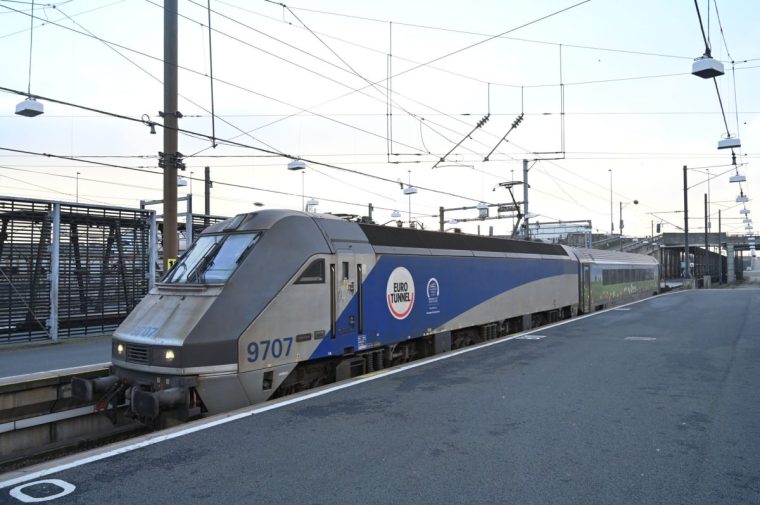New post-Brexit border controls that will require any Britons aged 12 and over to input photographs and fingerprints could spark “chaos” for holidaymakers travelling to the EU from October.
Industry insiders and EU experts issued the warning after Brussels confirmed its long-delayed Entry Exit System (EES) would start being rolled out from 12 October.
There are fears of disruption particularly at smaller European airports that experience booms in traffic during the school holidays, such as those in the Greek islands or in the south of France.
Higher food prices are also a concern if freight traffic is delayed at Dover – for example, when bus-loads of youngsters on school trips will be required to input their details.
Anand Menon, an expert in EU-UK relations, warned that the new measures could “cause chaos at peak times such as school holidays”.
The new rules mean Britons travelling to the EU will need to physically input fingerprints, photographs and other information at the UK’s border in the bloc as part of a new digital system designed to replace the manual stamping of passports on arrival and departure. Children under the age of 12 will not need to provide fingerprints.
New FeatureIn ShortQuick Stories. Same trusted journalism.
For many holidaymakers, this will be done upon arrival at their destination airport in the EU, but for some, it will mean stopping to hand over the data at UK ports like Dover, where there are so-called juxtaposed controls operated by French officials on the British side.
Millions spent on ports to limit disruption
British ports like Dover, the Eurostar terminal in London and the Channel Tunnel in Folkestone have had a year to prepare for the plans as well as £3.5m each from the Government, and do not expect “major” impacts on holidaymakers.
But there are fears that some EU member states will be less prepared, and airport chaos looms at busy times.
There are also concerns that any hitches at ports such as Dover could have knock-on delays on freight traffic that could lead to produce bound for British supermarkets spoiling, or EU companies even pulling out from exporting food to Britain.
A “reasonable worst case scenario” drawn up by the Department for Transport warned of 14-hour queues at Dover last year, although The i Paper understands that this figure has dropped “significantly” in an updated analysis, after EU tweaks and concessions on EES, including allowing the port to build a separate facility for the checks at its Western Docks.
The Government, however, refused to release the new figure, citing commercial sensitivity.
The i Paper understands the Channel Tunnel port at Folkestone has meanwhile spent a year modelling traffic flows, expanded its terminal, and created a large area where passengers can input their data at kiosks that will resemble petrol pump islands, with two kiosks per car on each side of every island, overseen by French officials.
 A Eurotunnel freight train arrives on the platform at the terminal at Folkestone (Photo: Glyn KirkK/AFP)
A Eurotunnel freight train arrives on the platform at the terminal at Folkestone (Photo: Glyn KirkK/AFP)
For a car of three, they expect that inputting the necessary data will add only five minutes to journey time, and the expanded terminal means more people can go through the port at once, meaning the trains can run on the same timetable.
Travellers to Greek islands and south of France could face delays
However, there are fears among some travel industry insiders that while some ports or airports had the time and money to spend preparing extensively, other smaller destinations may not be as ready.
There are particular concerns about small airports that are quiet for much of the year but experience booms in seasonal traffic, for example during school holidays, such as those in the Greek islands or south of France.
Early signs are that some of these airports have erected as few as four kiosks to input data, which insiders fear is nowhere near enough for the hundreds or thousands of travellers that could arrive in a short space of time in peak season.
And while an app that would allow passengers to provide some information for EES before arriving at a border crossing is set to be launched this year, airports in France, the Netherlands and Italy will not begin pilots of the app until 2026.
The European Commission claims the changes will eventually speed up checks at the border.
‘There will be all sorts of teething problems’
Menon, director of the UK In A Changing Europe think tank, said: “There will be all sorts of teething problems but these should not obscure the fact that there will be genuine problems as well.
“The fact is it’s going to be very, very time consuming for people going to Europe, particularly for the first time, and that is going to cause chaos.
“And you can expect it to cause chaos at peak times such as school holidays.
“There is going to be a load of disruption, even with e-gates, because you are going to have to go through this process once, and there are loads of forms to fill in.
“Brexit was basically about making it harder, more cumbersome and more expensive to do business between us and the EU and this is part of it.”
Logistics UK meanwhile raised concerns about freight traffic, particularly during the school holidays when “you’ve potentially got 35-45 people having to have the same check taken, schoolkids having to have all of their biometrics done, that’s going to have complexity”.
Josh Fenton, policy manager on borders at Logistics UK, said: “Credit where credit’s due, the port of Dover has invested serious sums of money. They have got a concession in that the Western Docks was being filled in so there’s a facility there for the coaches to be processed.
“So there’s going to be differentiation between the freight and the tourists, but it’s still going to make certain times of the year quite complex.”
New rules ‘could boost food inflation’
But Fenton said that Dover is a “sensitive” border that can be disrupted by anything from a lack of staff, to weather, to accidents on the road network or an IT system going down, “and all of these things have happened in very recent years.
“So what does that mean? It means that there would be disruption around the local road network in Kent. It could mean that if there was anything that we were exporting from the UK to the EU, that produce could be spoiled, or if it’s not spoiled, it’s definitely reduced the shelf life, which reduces its value.
“And long term, if that keeps happening at certain times of the year, we might find it more difficult to get drivers to come into the UK and to do that route, which would then potentially mean that certain times of the year you might struggle to get the produce that you’re used to. So you would sort of potentially see things changing on the supermarket shelves.
“It also could mean that, because logistics operates on a margin of 2.5 per cent roughly, that added complexity of [drivers] sitting idle, or added queues, or, running out of driver’s hours and those sorts of things, that then essentially means that costs cannot always be absorbed, and therefore, on certain occasions, [the costs] will have to be passed on, which then leads to food inflation.”
The British Ports Association welcomed tweaks the EU has made to its plans, including phasing in the system, to help minimise disruption.
“Here in the UK we will be ready and at this stage the BPA is not expecting major direct impacts at our ports,” a spokesman said.
“The new flexibility and approach will enable EU states to better manage any teething difficulties with their borders and so this will reduce any potential knock-on impacts in the UK.”
A spokesman for the Kent and Medway Resilience Forum, which helps prepare the area for, and respond to disruption, said: “KMRF partners – including central Government departments, emergency services and local authorities – continue to work hard to ensure we are prepared for the new EU border processes.”
A Government spokeswoman said: “We are planning for how EES could affect travel, so passengers and freight can keep moving without delay. That is why we have shared the updated modelling with key partners in Kent.
“Thanks to the phased rollout of EES, and recent investments in infrastructure at the Port of Dover and the Channel Tunnel, the risk of delays has been significantly reduced.”
A European Commission spokesperson said: “Once in place, the EES will modernise border management by increasing efficiency and quality of processes at the border. Travellers will spend less time at the border thanks to faster checks, self-service options, and the possibility to give their information in advance. This will ease the experience of travellers at the border crossing points.
“With the progressive start of operations of the EES, member states will start introducing the EES gradually over a period of six months. This will allow travellers, border authorities and the transport industry more time to adjust to the new procedures.
“As the launch date approaches, travellers can expect information campaigns and awareness-raising activities at border crossing points, including airports across the EU.”
